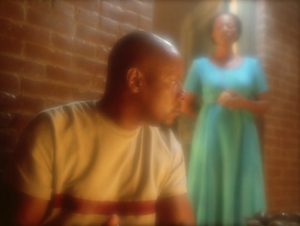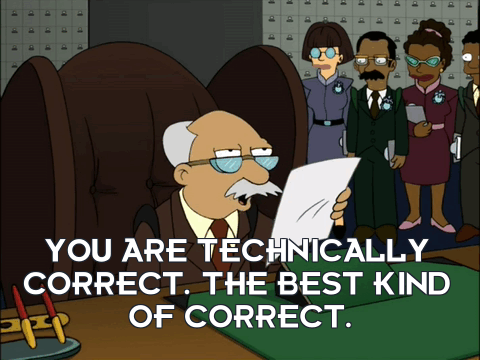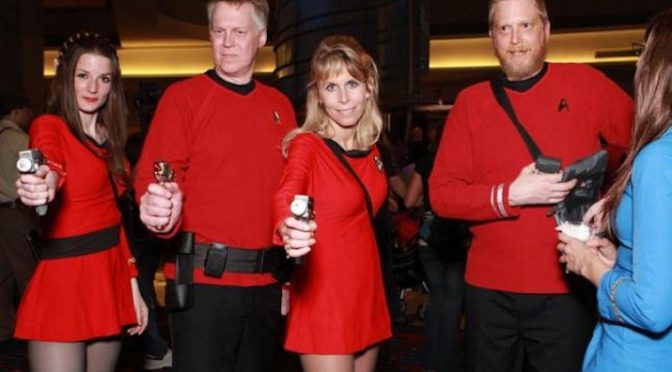(Edited on 8/26/16 to make a couple points clearer. Lesson to the kids at home: if you’re on medication, don’t forget to have someone check your work.)
So, an interesting thing happened last week. During a hazy day where I didn’t really feel like doing my planned blog I instead decided to shoot from the hip. Throwing together a blog on a topic I’d recently discussed with friends, I published it and figured that would be the end. Turns out, according to people on Twitter, mentioning Axanar is like yelling fire in a theater. Suddenly there was a swarm of people unlike anything this blog has ever seen before. As I was publishing last Wednesday’s post I looked up to see that a post I figured wouldn’t go anywhere suddenly had more traffic than the rest of my blog combined.

Now, half a lifetime on the internet has taught me three very important lessons about expressing personal opinions. First, never debate people in a format with a character limit, there in lies the path to madness. Second, never jump into the middle of a heated debate in a comments section, they will eat you. And, third, if you do see someone make a valid point, acknowledge and respond to it in a controlled setting. Thankfully, I own the setting.
Clarity And Lack There-of

The first perfectly valid criticism I saw was that my post was pure speculation. This is entirely correct and I don’t claim this blog to be anything other than that. I am not a journalist or a lawyer, merely a well-spoken asshole typing to you from a computer ostensibly operating on Windows 10 but actually being held together by the Necronomicon. Sitting in a house in the low rent district of a small town in the middle of a place I affectionately refer to as “the devil’s anus”, I have about as much authority on the subject as any other random person on the internet. Ergo, next to none.
Second, I don’t actually think that Discovery is going to do the Battle of Axanar, merely that it is going to feature a similar tone and premise. In fact, as some pointed out, Bryan Fuller wasn’t even hired until 2 months after the lawsuit and said point blank they weren’t going to cover that particular event. But, then again, I don’t think Fuller had anything to do with the lawsuit at all. Some would be confused about this because I say that Discovery was likely the root cause and Fuller is the showrunner. But, the problem with this criticism is that Fuller isn’t the sole creator, he’s the co-creator and that puts a wrinkle into the arguments that I didn’t pay attention to the timeline.
In the fervor it’s easy to forget a couple things about the production as far as the timeline goes. Fuller wasn’t brought on until February, as many pointed out, but he’s also one of two people credited as creator and one of five executive producers. The other creator, Alex Kurtzman, was on board with the project far earlier than him and is still credited for “co-creating” rather than just producing. It is incredibly unlikely that a new show was announced with only a 13 month development cycle if no one had made even so much as a pitch before Fuller showed up 3 months later. More likely, Kurtzman pitched the basic premise, CBS All Access decided to go with it, and Fuller was brought on as the man who could make an interesting story in the setting they had in mind. Can I be entirely sure? No. But once again – speculation.
At the end of the day, Fuller had no involvement in the lawsuit and he’s just going to do his best to make a good show. In fact, I couldn’t be happier about his involvement because his past work is very character driven and Trek, for all the phasers and warp drives, is a character driven show. As far as I see it, whatever conflict and overlap the two productions may have had was established before Fuller even entered the equation and his work since has likely been diverging the two. The only reason I even brought up his name last week was because he confirmed the idea that it’s a conflict of some sort set in the years leading up to TOS. Though not a lot to go on, it’s enough to raise a couple eyebrows.

But the third thing that I felt needed addressing was the clarity of copyright law. Because, for as much as people may want to speak on the legality of Axanar, that was never my intention – I was just pointing out CBS’ peculiar behavior. From where I sit, had CBS Paramount issued a Cease & Desist when the production raised a lot of money, it would have been unfortunate but have made some sense. For that matter, issuing the C&D after the second round of fundraising also would have made some sense. But, while they did talk to Axanar Productions, no official announcement of a C&D was made and the actual lawsuit was suspiciously timed. Whether you like what they’ve done or not, CBS Paramount had the legal right to step in sooner and simply…didn’t – at least, not until they started developing a new show.
The thing about copyright law is that it’s one of the most absurd pieces of legislation we have today. It’s simultaneously unclear and unforgiving – a bizarre combination. In fact, it’s worth noting that CBS’ actions prior to the lawsuit are partially explained by this strange little paradox. Had anyone from CBS Paramount said anything to the Axanar people along the lines of “don’t do [x]” – the omission of other details could have been counted as authorization. This is why a C&D, while not legally binding, is usually preferable because it lets you tell someone to walk away without necessarily setting any legal precedents against your own fan base. And it is the whole fan base because, even if you see Axanar as having gone too far, the letter of the law says every fan production has crossed most of the same lines.
For as long as fan works have existed, they’ve technically been illegal. Even walking through conventions you’ll find dozens, perhaps even hundreds, of people technically violating copyright law. Fan art, fan fiction, fan films, and even home-made costumes all exist in this strange grey area where they’re only legal until the IP owner says something and, even then, aren’t necessarily illegal in all cases. And that has nothing to do with the size of the infraction or whether it was commercial – copyright law cares nothing for these (outside of the Fair Use doctrine, but that’s a murky topic for another day).
Any time someone exchanges or produces an unlicensed work can be counted as a copyright violation. In fact, artwork commissions, a staple of many conventions, are actually fairly illegal under most circumstances because the artist is recreating the image of an IP they usually don’t own. Even if no money is exchanged, it’s actually a potential copyright violation because copyright law doesn’t establish anything about profit. Some would think that sounds like nonsense and simply drawing a picture shouldn’t be illegal. However, remember Disney once successfully went after three daycare centers for infringing trademark (something many fan works also violate) by painting characters on their wall.

In fact, we’re slowly entering an age where it is unlikely anyone has avoided violating copyright on some level. The mess of laws are sometimes so murky and even petty that it’s impossible to know for sure until you go to court. In fact, I’m willing to bet a lot of people who are reading this right now have actually violated copyright and could be considered a pirate without having ever known what they did. If you don’t believe me, let me provide an extreme example with this question: have you ever used a DVR?

You would think the fact that DVRs are provided by many TV providers would mean they’re 100% legal, but that’s not entirely true. Nearly a decade ago, as DVRs were still a new technology, several networks including ABC, NBC, and CBS sued Cablevision for copyright infringement over their inclusion of DVR to their set-top boxes. The thing is, initially, they won – and that would have been the beginning of the end of DVRs had the appeal not gone the other direction. But Cablevision did appeal and DVRs were found to be legal based on a couple technicalities that exemplify how murky copyright actually is.
The first loophole is that DVR services were found to be simply providing a service that could be used to create copies. The court decided this made them no more liable for what was being copied than a photo or print shop and that the person violating the copyright was actually the user. In their judgment, the actual pirates were not the DVR services but the people pressing the button. Now you would be forgiven to find this peculiar. After all, this means that Napster, The Pirate Bay, and most Torrent sites are just as innocent of piracy as DVR companies. Yet we know that Napster was firmly taken down, The Pirate Bay has long been plagued with legal problems, and Torrent sites generally have short lifespans. DVR services, meanwhile, managed to get away with it due to the specifics of the second technicality.
See, the second technicality, and a decision made post-Digital Millennium Copyright Act, is that a copy couldn’t be considered a violation unless the copy in question were “stable” and “permanent”. Essentially, if the copied material could be considered temporary it couldn’t be considered a violation. This means that temporary digital copies (such as in certain P2P streaming services) are technically legal. We know from years of experience that this isn’t how it generally happens in practice, but the precedent still exists for someone who can afford the defense.

Why does this matter when talking about fan-works? Because it’s only when watching two corporate entities fight it out that you can really see the truly confusing nature of modern copyright law. Given that DVRs actually do make copies, you would think they would be far more infringing than a fan-film. After all, most fan-films actually go out of their way to create at least some original content. But let’s say you were to act out scenes from the original product with your own cast. According to CBS Paramount’s new guidelines, they don’t even want you to do that. So this means that a properly motivated legal team could probably make a successful argument that you acting out scenes from the show is somehow less legal than basically downloading it. When did that start to make sense?
What was once a system designed to protect the rights of creators has long been changed by corporate lobbying into something quite different. The system as it exists today is a labyrinth of loopholes and provisions meant more for corporations than individuals. An individual can be protected by the system, but that’s more a byproduct than the actual intent anymore. And that results in a situation where you can’t even be entirely sure they won’t strike while you’re following their guidelines. Even Fair Use, meant to protect a variety of derivative works, is rarely enough to protect you from them if they have you in their sights (as demonstrated below).
Since the day corporations started to take ownership of IPs some of their craftier executives and lawyers have done everything they can to protect what they have, leave loopholes only they can see, and make sure you can’t decipher any of it. Even public domain, long benefiting many corporations by providing them material, has been irrevocably changed by their influence. Once upon a time, copyright was retained by a creator for 56 years. In 1976 it became the life of the author plus 50 years, or 75 years under a corporation. Then in the 90s it extended yet again. At the time Star Trek was created, the copyright was to expire in 2022, close enough for the Axanar guys to just sit on it and wait to release. Now, the copyright lasts until 2061 and will probably get extended again. It’s perfectly legal, but I’m not sure if it’s “right”.
In the end, we can’t really know for sure where any of this falls until after a court decides. It may be that CBS Paramount wins this based on designs, characters and location names. It may be that enough original material was produced for Axanar that it’s declared an original or transformative work. But we won’t know until the dust settles, and even then there may always be questions. For now, I sit here bemused that you may actually see real people exploring other planets before the copyright lapses. And if it does get extended, yet again, it’s also a little funny to note that this scene…
Happens in 2063, long before that extension would lapse.
(I write novels. According to current law, my copyrights will outlive me by at least 50 years. Come to think of it, same goes for my tweets.)







